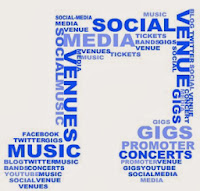I recently
read a post that really surprised me, talking about how social
media is actually negatively
affecting music. Before I read the post, I tried to come up with any reasons on
my own on how social media could possibly be harming musicians…I couldn’t even
think of one. After reading, although my eyes were opened to a few new ideas, I
would like to respectfully disagree with some of the points made by the author, Tony Hymes, in this post.
It begins by
reminding us of the “Glory Days” of social media, when we could genuinely
connect with interesting new things on cool platforms while receiving awesome
content that we enjoyed. Right away, I don’t understand how that has changed.
In fact, I believe we’ve been introduced to more and more interesting new
things on even cooler platforms. I am
not positive what the “Glory Days” consist of according to Hymes, and maybe that is why
this article does not make sense to me. I cannot think of a time when social
media was better than it is now.
Things like Myspace were great in their day, but now we have so many ways to
personally connect to artists and for them to connect with their fans. The most
obvious one I can think of is Twitter, of course, where we can follow our
favorite artists just the same as we follow our friends, and we can interact
with them as though we know them personally. A couple less obvious examples
that come to mind are Spotify and WhoSay. Spotify is not only great for just
making awesome playlists, but you get to share them, which means you get to see
what others share. This is a great way for fans to know what their role-model
musicians are listening to, and is a fantastic gateway to finding new music.
WhoSay is described as a “social celebrity magazine – brought to you by the
celebrities themselves”. Celebrities create a WhoSay account and connect all of
their social media channels to it, so fans get to see all of their content,
videos, photos, tweets, and other media, all posted onto one app.
Hymes
continues by saying “We are limited to twenty-four hours a day. The more things
we have to pay attention to, the less time we can spend on each one. If you
follow only a few people on Twitter, you see everything they post, you can
learn about them, their interests, their personalities; when you follow 1,000
people, do you really follow anyone anymore?”
While this
makes sense from that point of view, I would like to contradict it by saying
that following only a few people in depth on Twitter is not the point, and
never has been the point. Jack Dorsey, a creator of Twitter, says this on how
they decided on a name for Twitter:
“…we came up
with the word ‘twitch’, because the phone kind of vibrates when it moves. But
‘twitch’ is not a good product name because it doesn’t bring up the right
imagery. So we looked in the dictionary for words around it, and we came across
the word ‘twitter’, and it was just perfect. The definition was ‘a short burst
of inconsequential information,’ and ‘chirps from birds.’ And that’s exactly
what the product was.”
I think that
many musicians would argue against this article, because social media is
helping boost their careers in ways that never used to be possible. They
enthusiastically use social media to connect with their fans and promote their
new music by creating buzz, asking fans directly what they want, having
contests to get fans excited, and so much more. Hymes says “Anyone today can
create a song and broadcast it to the world.” But how can you broadcast
anything to the world without things like “followers” and “subscribers”? It
just would not be possible if social media didn’t exist the way it does.
Links:

